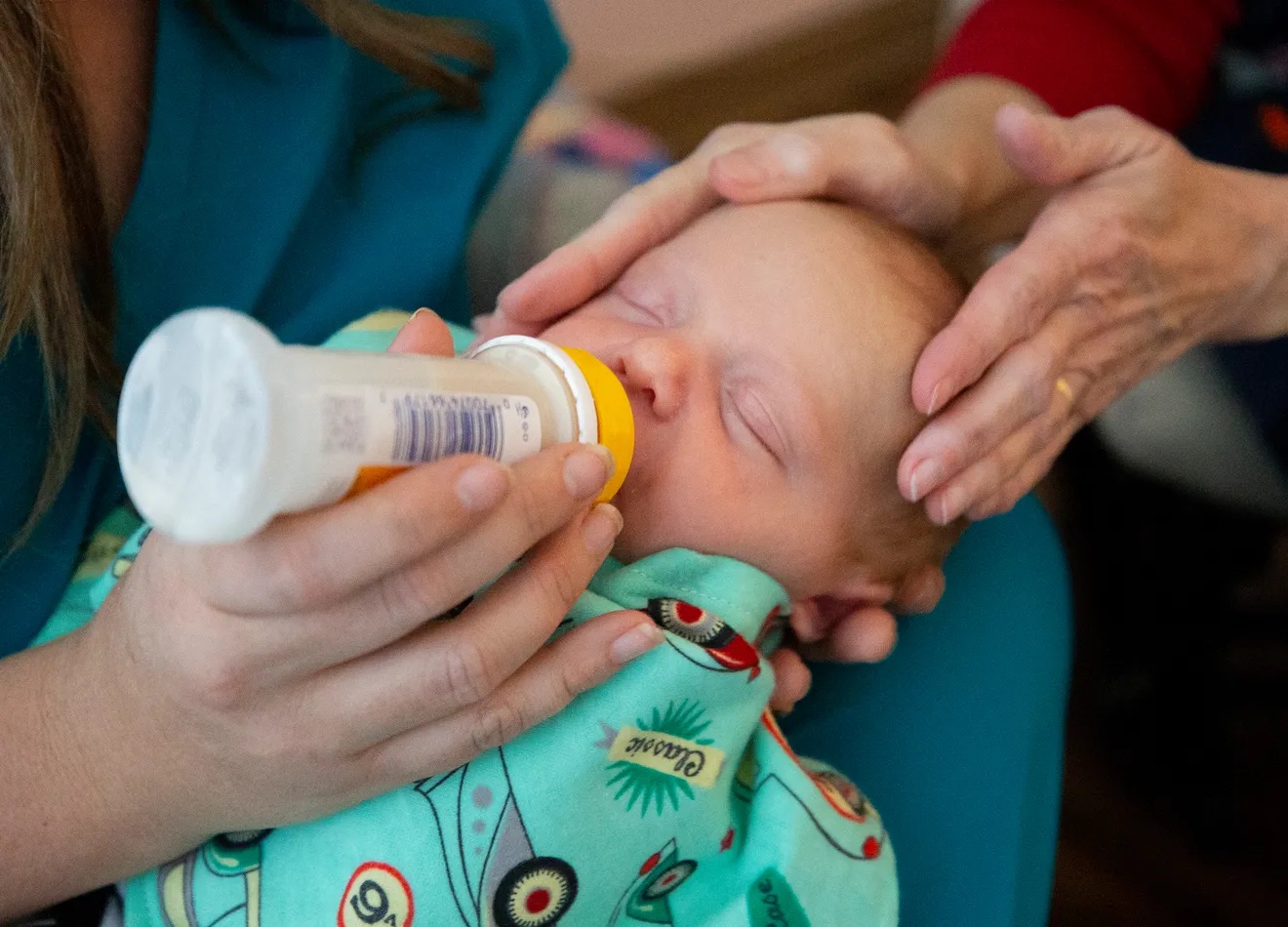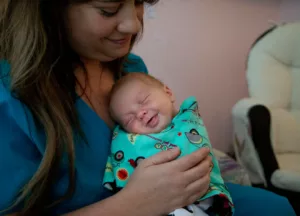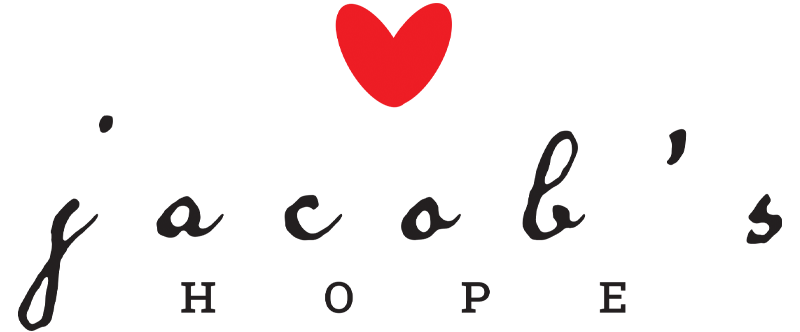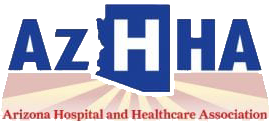
New Mesa facility designed to care for babies with prenatal substance abuse
A new Mesa facility that provides ongoing care for babies suffering withdrawal symptoms caused by prenatal exposure to addictive drugs welcomed its first baby on Nov. 27, and intends to take in many more going forward.
Jacob’s Hope is a facility licensed by the Arizona Department of Health Services. It offers care and support for families of infants with neonatal abstinence syndrome (NAS) once they leave the hospital but before they are able to go home.
Brian Jones, executive director, said his wife and her best friend started the facility because their own son, Jacob Jones, suffered from substance abuse throughout his life after his birth mother took methadone while she was pregnant with him.
Jacob was born in 1988 and then adopted by Brian and Jo Jones. At the time, Brian Jones said the couple did not know what infant substance abuse looked like or how to handle the situation.
When mothers struggle with substance abuse while pregnant, babies are born with withdrawal symptoms and need a more focused care than most children, Jones said.

“The doctors said if he (Jacob) met his milestones, he would be fine,” Jones said. However, Jacob struggled with substance abuse and addiction for most of his life. He was killed in 2014 after being involved in a drug murder two days before his 25th birthday.
Jo Jones wanted to help other parents who face a similar situation with a newborn.
She served on the Foster Care Review Board for Arizona when she was given a book by Barbara Drennin, founder of Pediatric Interim Care center in Washington, titled “Caring for Drug-Exposed Infants.” This center has been working with substance exposed infants since 1990, Brian Jones said.
Jones gave the book to her best friend, Leslie Blowers, and the two of them worked to get licensing to open their own facility in Arizona, Brian Jones said.
The process took three years and many ups and downs. They originally were denied licensing by the Office of License and Registration in Arizona, but Jacob’s Hope opened its doors this year, on March 11, Jones said.
He said more than 800 babies are born each year in Arizona with traces of drugs in their system caused by their mothers’ exposure to the substances.
Jones said the facility works directly with hospitals who can refer parents to Jacob’s Hope.
The Neonatal Intensive Care Unit at Phoenix Children’s Hospital embraced the mission of Jacob’s Hope and sent the first baby over to the facility on Nov. 27. The baby will receive immediate care needed to support the infant, who is struggling with withdrawal symptoms, Jones said.
The baby, who is being referred to as Jacob’s Hope First Baby, is under care at the Mesa facility where nurses are working to wean the 3-week-old off morphine, which was helping to mask the symptoms of his withdrawal, Jones said.
The baby’s mother was on a Medical Assisted Treatment program while pregnant with her son, which exposed him to methadone, Jones said.
Jones said the baby was being treated at Phoenix Children’s Hospital for jaundice when the hospital staff told the mother there was a place for the baby to receive treatment for his withdrawal symptoms. It was then up to the mother to make the decision take her son to the Jacob’s Hope facility.
Immediate consoling care provided
At Jacob’s Hope, there is one nurse for every two babies, Brian Jones said.
At Jacob’s Hope, each baby is receiving immediate consoling through nurturing from nurses and is able to feed on its own schedule, as opposed to more set routines at a NICU, he said.
“Babies with NAS don’t need to be in NICUs, they need immediate consoling care, which is what Jacob’s Hope has been designed around,” Jones said.

The babies spend their day in a quiet, low-lighting nursery as babies with drug substances in their system are sensitive to high-stimulation, Jones said.
The facility has the capacity for 12 babies, with two in each nursery. The facility also has a bathing room. All blankets, clothing, and supplies have been donated to the organization. Also, a baby formula company is providing the facility with free formula of all different types to meet each baby’s needs.
All the nurses on staff are either registered nurses or certified nursing assistants who also work in another hospital, Jones said.
Jacob’s Hope is a three-step process, with the first providing immediate care to the infant, parent support and training for caring for their child and long-term connections to services they may need. Parents are granted extended visitation and are able to come spend time with their child whenever they wish.
“At Jacob’s Hope, we are focusing on one thing and that’s care for these infants,” Jones said.

The infants are provided medical care, while the staff also focuses on basic behavioral milestones. In fact, Jacob’s Hope First Baby just experienced his first “tummy-time” last week.
Cami Barr, director of Tucson Medical Center’s NICU, says babies with NAS require special feeding, holding and care techniques. She has experience of working with NAS babies for more than 30 years and works at Jacob’s Hope to help the parents and the other staff learn correct techniques of care.
Brian Jones said the facility has the ability to do lab testing if the infant needs. The babies are monitored at all times by nurses but are not hooked up to a monitor, only for spot checks.
Funding from private donors and churches
Jacob’s Hope is a nonprofit, faith-based organization that receives all its funding from private donors and churches, Jones said.
“Jacob’s Hope has received no money from the government,” but they have constant donations from private donors, Jones said.
When Jo Jones and Leslie Bowers first had the vision, they relied on support from people with the same mission and also collaborated with other organizations nationally similar to Jacob’s Hope, Brian Jones said.

“We lost a son and it set my wife on a path to surround herself with people with the same mission,” Jones said.
Jacob’s Hope is covered under federal Medicaid funds for those who qualify, Jones said. Typically, babies born with NAS are kept in hospitals and cost Medicaid anywhere from $2,600 to $4,000 daily per baby. But babies kept at Jacob’s Hope cut this cost down on an average of 50% per baby, per day, Jones said.
A mission to send the infant home
Jacob’s Hope works to simulate a home environment so that the baby is prepared to eventually be brought home by the parents. Jones said the national average for these types of organizations is 40 days under care.
The facility pairs parents with services they may need for long-term care after taking the child home. They also want to ensure that the baby goes home with everything it needs, such as blankets, clothing and also a scrapbook full of photos from the baby’s time at the facility, Jones said.

Jones said there is research behind intervening early enough in a infant’s life to hopefully change paths in the brain and prevent the infant from having substance or addiction problems in the future.
“Without Jo and Leslie’s vision, we don’t exist. Without the team we have surrounded, we don’t exist,” Jones said.




